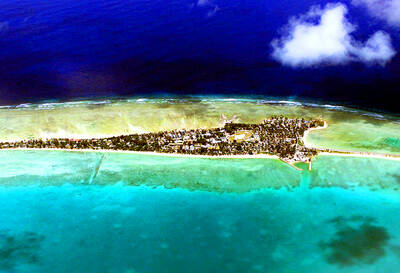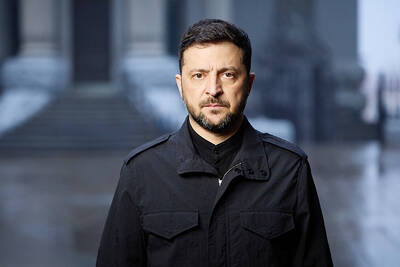Palestinian President Mahmoud Abbas on Friday denied an account by another Palestinian official of a meeting with US President George W. Bush, in which Bush is cited as saying he believed that God told him to go to war in Afghanistan and Iraq.
A statement in Abbas' name released by his office said that an excerpt from an interview with Palestinian Information Minister Nabil Shaath due to be broadcast by the British Broadcasting Corp in which Shaath described a meeting with Bush in June 2003 gave a "completely false" account.
In the interview for the series "Israel and the Arabs." Shaath described the meeting, at which he said Abbas was present.
"President Bush said to all of us: `I'm driven with a mission from God. God would tell me, `George, go and fight those terrorists in Afghanistan.' And I did. And then God would tell me, `George, go and end the tyranny in Iraq.' And I did," Shaath said.
Bush went on: "And now, again, I feel God's words coming to me, `Go get the Palestinians their state and get the Israelis their security, and get peace in the Middle East.' And, by God, I'm gonna do it."
Bush, who became a born-again Christian at 40, is one of the most overtly religious leaders to occupy the White House, a fact which brings him much support in middle America.
Soon after, the Israeli daily newspaper Haaretz carried a Palestinian transcript of the meeting, containing a version of Bush's remarks. But the Palestinian delegation was reluctant publicly to acknowledge its authenticity.
"This report is not true," the Abbas statement said on Friday. "I have never heard President Bush talking about religion as a reason behind the wars in Iraq and Afghanistan. President Bush has never mentioned that in front of me on any occasion and specifically not during my visit in 2003."
The BBC persuaded Shaath to go on the record for the first time for a three-part series. Israel and the Arabs: Elusive Peace will be broadcast in Britain on Oct. 10, 17 and 24, and in its entirety on PBS in the US.
Religion also surfaced as an issue when Bush and British Prime Minister Tony Blair were reported to have prayed together in 2002 at his ranch at Crawford, Texas -- the summit at which the invasion of Iraq was agreed in principle. Blair has consistently refused to admit or deny the claim.
Mahmoud Abbas, who was also part of the delegation at Sharm el-Sheikh, told the BBC that Bush said: "I have a moral and religious obligation. I must get you a Palestinian state. And I will."
Shaath's comments came as Bush delivered a speech on Thursday aimed at bolstering US support for the Iraq war.
"We're facing a radical ideology with unalterable objectives: to enslave whole nations and intimidate the world," he said.
He conceded that insurgents had gained ground in Iraq but the US would not leave until security had been established.
"Some observers also claim that America would be better off by cutting our losses and leaving Iraq now. This is a dangerous illusion, refuted with a simple question: Would the United States and other free nations be more safe, or less safe, with Zarqawi and Bin Laden in control of Iraq, its people, and its resources?" Bush asked.

DISASTER: The Bangladesh Meteorological Department recorded a magnitude 5.7 and tremors reached as far as Kolkata, India, more than 300km away from the epicenter A powerful earthquake struck Bangladesh yesterday outside the crowded capital, Dhaka, killing at least five people and injuring about a hundred, the government said. The magnitude 5.5 quake struck at 10:38am near Narsingdi, Bangladesh, about 33km from Dhaka, the US Geological Survey (USGS) said. The earthquake sparked fear and chaos with many in the Muslim-majority nation of 170 million people at home on their day off. AFP reporters in Dhaka said they saw people weeping in the streets while others appeared shocked. Bangladesh Interim Leader Muhammad Yunus expressed his “deep shock and sorrow over the news of casualties in various districts.” At least five people,

It is one of the world’s most famous unsolved codes whose answer could sell for a fortune — but two US friends say they have already found the secret hidden by Kryptos. The S-shaped copper sculpture has baffled cryptography enthusiasts since its 1990 installation on the grounds of the CIA headquarters in Virginia, with three of its four messages deciphered so far. Yet K4, the final passage, has kept codebreakers scratching their heads. Sculptor Jim Sanborn, 80, has been so overwhelmed by guesses that he started charging US$50 for each response. Sanborn in August announced he would auction the 97-character solution to K4

SHOW OF FORCE: The US has held nine multilateral drills near Guam in the past four months, which Australia said was important to deter coercion in the region Five Chinese research vessels, including ships used for space and missile tracking and underwater mapping, were active in the northwest Pacific last month, as the US stepped up military exercises, data compiled by a Guam-based group shows. Rapid militarization in the northern Pacific gets insufficient attention, the Pacific Center for Island Security said, adding that it makes island populations a potential target in any great-power conflict. “If you look at the number of US and bilateral and multilateral exercises, there is a lot of activity,” Leland Bettis, the director of the group that seeks to flag regional security risks, said in an

‘DIGNITY’: The Ukrainian president said that ‘we did not not betray Ukraine then, we will not do so now,’ amid US pressure to give significant concessions to Russia Ukrainian President Volodymyr Zelenskiy on Friday pushed back against a US plan to end the war in Ukraine, while Russian President Vladimir Putin welcomed the proposal that includes many of his hardline demands. With US President Donald Trump giving Ukraine less than a week to sign, Zelenskiy pledged to work to ensure any deal would not “betray” Ukraine’s interests, while acknowledging he risked losing Washington as an ally. Putin said the blueprint could “lay the foundation” for a final peace settlement, but threatened more land seizures if Ukraine walked away from negotiations. Ukraine faces one of the most challenging moments in its history,